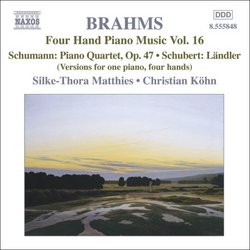| All Artists: Robert Schumann, Joseph Joachim, Franz [Vienna] Schubert, Christian Kohn, Silke-Thora Matthies Title: Brahms: Four Hand Piano Music, Vol. 16 Members Wishing: 0 Total Copies: 0 Label: Naxos Original Release Date: 1/1/2006 Re-Release Date: 8/29/2006 Genre: Classical Styles: Chamber Music, Historical Periods, Classical (c.1770-1830) Number of Discs: 1 SwapaCD Credits: 1 UPC: 747313584826 |
Search - Robert Schumann, Joseph Joachim, Franz [Vienna] Schubert :: Brahms: Four Hand Piano Music, Vol. 16
 | Robert Schumann, Joseph Joachim, Franz [Vienna] Schubert Brahms: Four Hand Piano Music, Vol. 16 Genre: Classical
|
Larger Image |
CD Details |
CD ReviewsBrahms's Four-Hand Arrangement of Others' Music J Scott Morrison | Middlebury VT, USA | 09/01/2006 (4 out of 5 stars) "With Volume 16 of this marvelous series of Brahms four-hand music we come to a CD that contains no original music by Brahms. It comprises arrangements of others' music: Schumann's Piano Quartet, Joseph Joachim's 'Hamlet' Overture, and twenty Ländler by Schubert. And, sad to say, none of this music is as interesting as much of the music on previous releases in the series although it is all played marvelously by Silke-Thora Matthies and Christian Köhn.
Schumann's Piano Quartet in E Flat, Op. 47, has never enjoyed quite the popularity of his Piano Quintet in the same key, but it is nonetheless a marvelous piece and is by far the most interesting music on this CD. It is assumed that Brahms arranged it for piano duet so that amateurs, in the time before recordings, could play it at home. (One also guesses that he did so as a favor to the Schumanns as by the time he made the arrangement Schumann was confined in an asylum where he would die a year or so later.) It is skillfully done but frankly it seems to me that it loses something in the translation although Matthies and Köhn make the best possible case for it. Joachim's 'Hamlet' Overture is a dull affair. It is a somber piece that sometimes achieves dramatic effect but for the most part it is an inward work that has an undistinguished chromatic main theme that, although put through the obligatory contrapuntal hoops, does not amount to much. The twenty Schubert Ländler (from D.366 and D.814) are altogether lighter and technically easier than the foregoing material. They are pleasant and one can easily imagine two only moderately skilled pianists enjoying playing them. But they are not really concert material and I found my interest waning rather drastically. It would appear that we are reaching the bottom of the barrel as regards Brahms's voluminous piano-duet works. Indeed, it is possible -- if one reads Grove's on the subject -- that this is the last or next-to-last of the series. All in all this has been a significant contribution to Brahms recordings and I treasure them all, if this one somewhat less so. Scott Morrison" |

 Track Listings (25) - Disc #1
Track Listings (25) - Disc #1